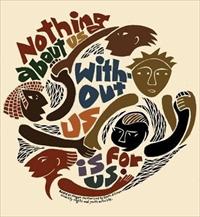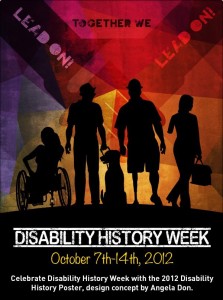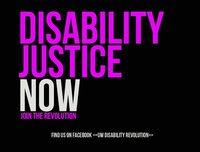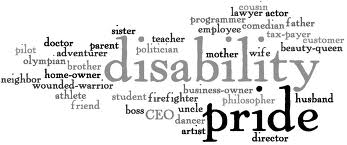Ableist Language in Social Justice Spaces: It’s Not Just About the Words
One of the most difficult things for me about hanging out in Internet social justice spaces is the sheer amount of ableist language that gets thrown around there. Some of us point out the language and ask people to refrain from using it, but it rarely works. There are days that, if I wanted to, I could make a full-time job out of calling out every iteration of “He’s insane” and “What a moron” that people trot out to describe putatively “normal” folk who hold egregious views or dictate bad social policy. The pushback is usually along the lines of “We have more important things to do than talk about words” and “You’re asking too much” and “We shouldn’t have to protect you from nasty speech on the Internet.”
I’ve been thinking a lot about these kinds of discussions, because they all follow a similar pattern, and they all tend to focus on language. I find that focus enormously frustrating because, for me, it is never just about language. It’s about the level of devaluation and disability hatred that lies beneath the language. Much of this devaluation and hatred are unintentional, but that doesn’t make their impact on people’s lives any less.
The devaluation is acceptable and normal. People who are of non-normative intelligence or ability (narrowly defined) are simply considered less-than, so it’s the height of insult to call someone “stupid” or “a moron” or “a person with a low IQ.” Likewise, people with severe disability are considered less-than, so it’s perfectly acceptable to respond to an argument you don’t agree with by saying “If you believe that, you shouldn’t go out without a carer.” (Yes, I have heard someone say that in a social justice space. I could almost see the sneer.) When I hear these kinds of words, it’s the hatred and devaluation I’m responding to, because it’s everywhere, and it has a concrete impact on people’s lives, including my life, the lives of people I love, and the lives of people I serve.
Much of the time when we talk about ableism in social justice spaces, it’s not in the context of violence, lack of services, the valuation of ability, the construct of normalcy, hate crime, institutionalization, homelessness, inaccessibility, isolation, and a number of other issues that intersect in all kinds of ways with race, queer, class, and trans* issues. The fact that disability isn’t incorporated into these spaces as its own social justice issue leads to discussions on language that can end up feeling very theoretical and rather precious. The issue really isn’t about language at all, but about the pervasive impact of the kinds of hatred that the language betrays. If there is no discussion about the impact of that hatred, though, then questions of language lose their grounding.
For me, language discussions are always about concrete things. We think in language, and it forms how we address the problems that face us. It’s the problems that concern me — and the ways in which language reinforces them, frames them, and limits our ability to look at them.
© 2013 by Rachel Cohen-Rottenberg









2 comments already | Leave your own comment
David Hoffman
10/21/2013 | 3:37 pm Permalink
I have also spent years struggling to address this issue with other leftists and progressives. It’s flabbergasting to hear people recycle the same rationalizations and evasions, about oppressive language patterns that we first had to endure around race, gender and sexual orientation. It’s not as though I’m immune or innocent. I’ve spent years examining the emotional and cultural roots beneath my own programming of fear, shame and revulsion against disability. People are so oblivious (NOTE: NOT “BLIND” or “STUPID”) but oblivious about why disability epithets carry the emotional and rhetorical force they do.
On a nonconscious level we mistakenly equate the intensity of rage and hostility which accompanies the spewing of disability epithets with strength, defiance and righteous indignation. We experience a false catharsis when we utter such words, which is partly a subconscious fantasy that we are “casting out” something evil.
But those are misconceptions which inaccurately cloak the real impulses which give such words their force. What actually gives them force is the fear and self/other – loathing that we’ve been programmed to attach to disability by our culture.
It will require a concerted campaign, enlisting respected opinion leaders from throughout the Left, to change this. It’s possible we can do that, but it’s also possible that we will always be enduring a massive, unremedied deluge of disability-stigmatizing attitudes and behavior, that remains unresolved no matter what we try. That’s no reason to give up. Just a reality we need to contemplate, to help us survive the pain of perhaps unending, repeated wounding.
Trackbacks & Pingbacks
[…] Rachel Cohen-Rottenberg posts about her struggles confronting ableist language among social justice […]